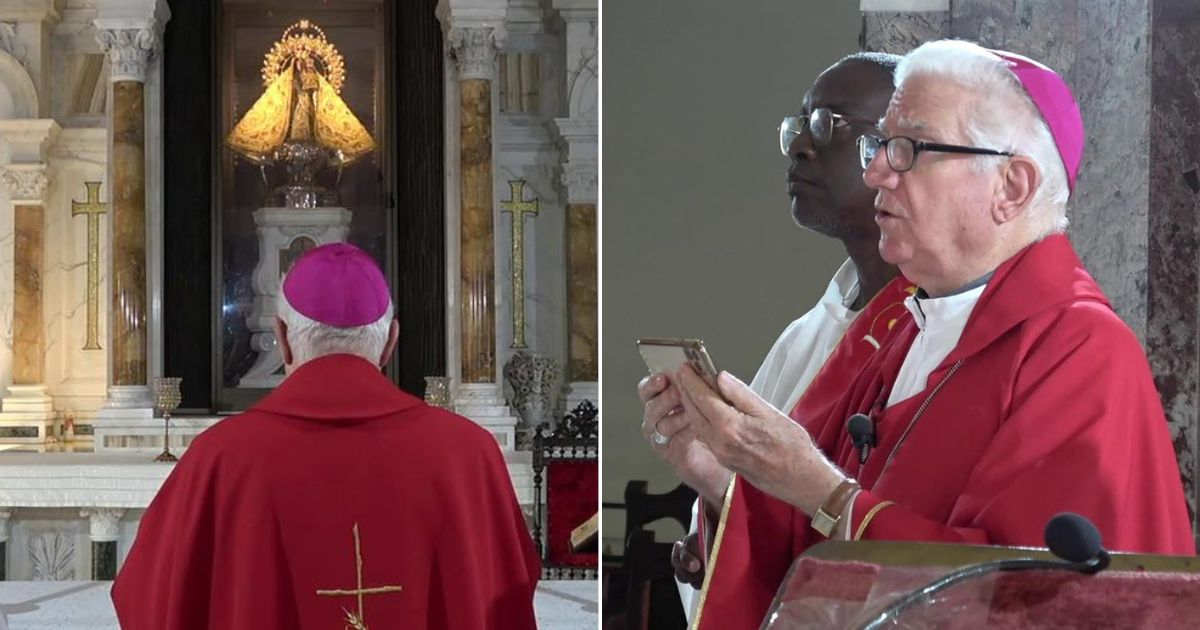Under the watchful gaze of the Virgin of Charity of Cobre, during this Sunday’s Eucharist, the Archbishop of Santiago de Cuba, Monsignor Dionisio García Ibáñez, called on Cubans to seek harmony and accept different ways of thinking as a path to peace. “With the potential that our people have, let us learn to live in harmony, with one heart and one soul, embracing different ways of thinking, and together, find solutions that lead us to be born in peace, to work in peace, to eat in peace, to die in peace,” García expressed during a supplication prayer, as published by the Archdiocese of Santiago de Cuba on Facebook.
In his prayer, García expressed gratitude to “the children who lovingly care for the elderly at home; those who, from afar, support their families and friends; the neighbors who support each other in times of sorrow and joy; and so many others who selflessly serve their fellow men,” referencing the current issue of young people migrating and leaving their often elderly relatives behind.
During the supplication, the Archbishop emphasized the search for comfort and strength “in these very challenging times.” He highlighted the hard work of mothers striving to provide food for their children amid difficulties, as well as the tireless efforts of those seeking medicines during extreme shortages.
The religious leader included in his petitions the “families of prisoners who dream of seeing them return home healthy someday,” hinting at the insecurity affecting the prison population, causing anxiety among their loved ones.
“The workers trying to provide a decent home for their loved ones; those who mourn the migration of spouses, children, grandchildren, friends; those who suffer from violence and theft; those who endure so many material and spiritual shortages,” were also included in the Archbishop’s prayers, reflecting the despair and anguish felt by both believers and non-believers today.
The Archbishop of Santiago de Cuba often intercedes for better living conditions for Cubans in his masses. Last March, during the Palm Sunday Eucharist, García asked the Virgin of Charity of Cobre for electricity, food, and freedom, stating that he was merely echoing the requests that pilgrims make to Cuba’s Patroness.
“We want to live more comfortably, we want to try to live a normal life where everyone can make their plans, their life projects, where life is not a perpetual struggle and toil,” García Ibáñez said at the feet of the Virgin.
Understanding Archbishop García's Call for Unity
In light of the Archbishop’s recent message, many have questions about his call for unity and the broader implications for Cuba. Here are some frequently asked questions and answers.
What did Archbishop García emphasize in his prayer?
Archbishop García emphasized the importance of harmony and accepting different perspectives as a path to peace. He also highlighted gratitude for those caring for others and the efforts of mothers and families in difficult times.
Why is the issue of migration significant in García’s message?
Migration is significant in García’s message as it highlights the separation of families, especially elderly relatives left behind, and the broader social impact on the community.
What specific hardships did García mention in his prayer?
García mentioned the struggles of mothers to provide food, the scarcity of medicines, the plight of families of prisoners, and the overall material and spiritual shortages faced by Cubans.
